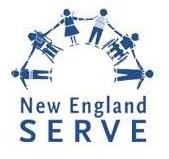
Consortium Outreach
Monthly E-Newsletter of the Massachusetts Consortium for Children with Special Health Care Needs
In This Issue
Identifying Top Priorities
for CYSHCN
![]() As you plan your end-of-
As you plan your end-of-![]() year charitable giving, please consider making a donation to support the Massachusetts Consortium for Children with Special Health Care Needs. It's tax deductible through our 501(c)3 fiscal sponsor, Third Sector New England, and it's easy to do with our new click-and-pledge system. An e-mail with more information will be sent to you shortly. Many thanks!
year charitable giving, please consider making a donation to support the Massachusetts Consortium for Children with Special Health Care Needs. It's tax deductible through our 501(c)3 fiscal sponsor, Third Sector New England, and it's easy to do with our new click-and-pledge system. An e-mail with more information will be sent to you shortly. Many thanks!
In the Spotlight:
New England SERVE
The Consortium congratulates New England![]() SERVE and its founding Executive Director, Susan G. Epstein, on New England SERVE's 25th anniversary.
SERVE and its founding Executive Director, Susan G. Epstein, on New England SERVE's 25th anniversary.
An independent organization with a focus on children with special health care needs, New England SERVE has always worked to create collaboration among professionals in all types of health care settings and the families they serve.
In 1999 New England SERVE established the Massachusetts Consortium
for Children with Special Health Care Needs, and Ms. Epstein continues to serve on the Consortium's steering committee.
Next Meeting
Date, Topic and Location TBA
Join Our Mailing
List
or change your
preferences
December, 2008
Dear Consortium Members and Friends,
Welcome to the December issue of the Consortium Outreach, our monthly e-newsletter to keep you updated on all the Consortium's activities. I am pleased to report the following updates:
Identifying Top Priorities for CYSHCN

![]() Medical home, family support programs and constituency-building were among the highest priorities identified at a recent meeting of child health leaders in the state. The invitational meeting held on December 16 was co-hosted by the Massachusetts Department of Public Health and the Massachusetts Consortium for Children with Special Health Care Needs.
Medical home, family support programs and constituency-building were among the highest priorities identified at a recent meeting of child health leaders in the state. The invitational meeting held on December 16 was co-hosted by the Massachusetts Department of Public Health and the Massachusetts Consortium for Children with Special Health Care Needs.
Approximately 40 stakeholders, including physicians, family advocates, public and private payers, and policy analysts were there to discuss and advise on potential policy directions. A panel moderated by Nancy Turnbull of the Harvard School of Public Health included Meg Comeau, Catalyst Center: Improving Financing of Care for Children and Youth with Special Health Care Needs; Barry Zallen, Blue Cross Blue Shield of Massachusetts; Judith Palfrey, Children's Hospital Boston; and Deborah Klein Walker, Abt Associates. Deborah Allen of the Boston Public Health Commission facilitated the discussion that followed.
Additional priorities included better measurement of the quality of care that children and families recieve, access to health care for all families, care coordination and the integration of public service systems, underinsurance and medical debt, and communication between schools and children's health care providers.
One thing on which all participants seemed to agree: the tenuous circumstances of our current economic climate make cross-sector, cross-agency, and cross-industry collaboration of the sort demonstrated at this meeting more important than ever.
Photo: Betsy Anderson
The Consortium's Community-Based Systems of Care Work Group and the Family-to-Family Health Information Center have released Getting a Break: A Roadmap to Respite Care for Massachusetts Families of Children with Special Health Care Needs.
Respite care gives parents a needed break from caregiving. The work group found that many Massachusetts families of children with special needs either don't know about respite programs at all, or don't know how to find them. This was especially true for families whose children began receiving services after age 3, and so did not participate in Early Intervention.
The Getting a Break brochure features a grid that delineates publicly-funded respite programs in Massachusetts and their eligibility requirements. Information was provided by five state agencies: the Departments of Public Health, Mental Retardation, Mental Health, and Children and Families; and the Massachusetts Commission for the Blind.
Also included are parents' tips for other parents on finding respite care providers and making the most of limited respite resources.
Click on the image for more information and to download your copy.
Central MA Respite Project to Begin Year 2
There is a huge demand for respite care, but few available workers. The Central Massachusetts Respite Project (CMRP) is working to address that problem, both by providing much needed respite services to families, and by creating opportunities for college students to get hands-on training as respite care providers.
The CMRP was piloted as a collaboration among the Seven Hills Foundation, UMass Memorial Children's Medical Center, Quinsigamond Community College, and the Consortium-affiliated Central Massachusetts Partnership for Children and Youth with Special Health Care Needs. The Year 1 pilot was funded by a grant from the Health Foundation of Central Massachusetts. Year 2 for the CMRP begins in January with partial funding from Boston Scientific.
To date, nine college students have enrolled and completed CMRP internships, supporting seven families who each have a child with special health care needs. Next semester, students from Quinsigamond Community College, Becker College and Fitchburg State will participate.
A new course at Quinsigamond, "Families and Children with Special Health Care Needs," will also be offered this 2009 spring semester. The course has been designed to dovetail with the CMRP internship.
For more information about the CMRP, please contact Celia E. Brown at cbrown@sevenhills.org.
Happy holidays to all!
Sincerely,
Chris Fluet
Executive Director
Massachusetts Consortium for Children with Special Health Care Needs

